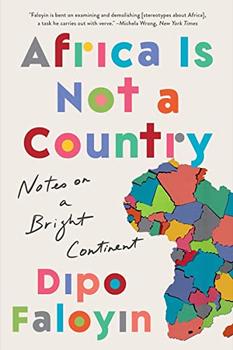Summary | Excerpt | Reviews | Beyond the Book | Read-Alikes | Genres & Themes | Author Bio

Notes on a Bright Continent
by Dipo FaloyinThis article relates to Africa Is Not a Country
What exactly is a white-savior complex (also known as white saviorism)? In Dipo Faloyin's Africa Is Not a Country: Notes on a Bright Continent, the definition is not as important as the negative impacts upon those who experience it.
According to Black Equality Resources, white-savior complex is defined as "an idea in which a white person, or more broadly a white culture, 'rescues' people of color from their own situation." The phenomenon manifests most visibly in the realms of media, activism and volunteerism, and essentially "imposes the notion that the white person knows what communities of color need, rather than listening to how they can truly be of help."
This insidious complex was roundly condemned 10 years ago in an article by author Teju Cole in The Atlantic. It was written in response to a viral video called Kony 2012 (covered in detail in Faloyin's book) that epitomized the white-savior mentality. The video and the charity that sprung from it, Invisible Children, were developed by Jason Russell, a white American activist and director, to bring attention to — and stop — the depredations of Ugandan militant and rebel warlord, Joseph Kony, who kidnapped Ugandan children and turned them into soldiers, among other crimes.
In the article, Cole claims that "Africa has provided a space onto which white egos can conveniently be projected. It is a liberated space in which the usual rules do not apply: A nobody from America or Europe can go to Africa and become a godlike savior or, at the very least, have his or her emotional needs satisfied. Many have done it under the banner of 'making a difference.'" But as he eloquently explains, it utterly negates the human agency and individualism of Ugandans (and other Africans and people living in other places where this occurs) to address their own affairs. While acknowledging that Africa has its share of problems with governance, infrastructure, and law and order, he reminds readers that these problems are intricate and intensely local in nature, and are not "reducible to slogans."
While many people wish to help others in need (and usually with good intentions), it is critical to understand the racial, cultural and social milieu when attempting to contribute. Black Equality Resources provides a helpful checklist for those who wish to avoid slipping into white saviorism while conducting anti-racist activism, which can be applied more broadly to works of charity or volunteerism. Some questions you might ask yourself are:
Faloyin gives perhaps the best advice — and perspective — for those who want to help in Africa: visit the continent, but "first ask yourself this question: 'How would I act in a homeless shelter in London or Madrid or Sydney?' Would you ask everyone to stop what they were doing to pose for a photo with you as the centrepiece? Upon seeing a child going about their child-like business, would you stop them, pick them up and hold them aloft like a trophy? I assume not. So resist this urge when you're on the continent."
Filed under Society and Politics
![]() This "beyond the book article" relates to Africa Is Not a Country. It originally ran in October 2022 and has been updated for the
November 2023 paperback edition.
Go to magazine.
This "beyond the book article" relates to Africa Is Not a Country. It originally ran in October 2022 and has been updated for the
November 2023 paperback edition.
Go to magazine.
Your guide toexceptional books
BookBrowse seeks out and recommends the best in contemporary fiction and nonfiction—books that not only engage and entertain but also deepen our understanding of ourselves and the world around us.